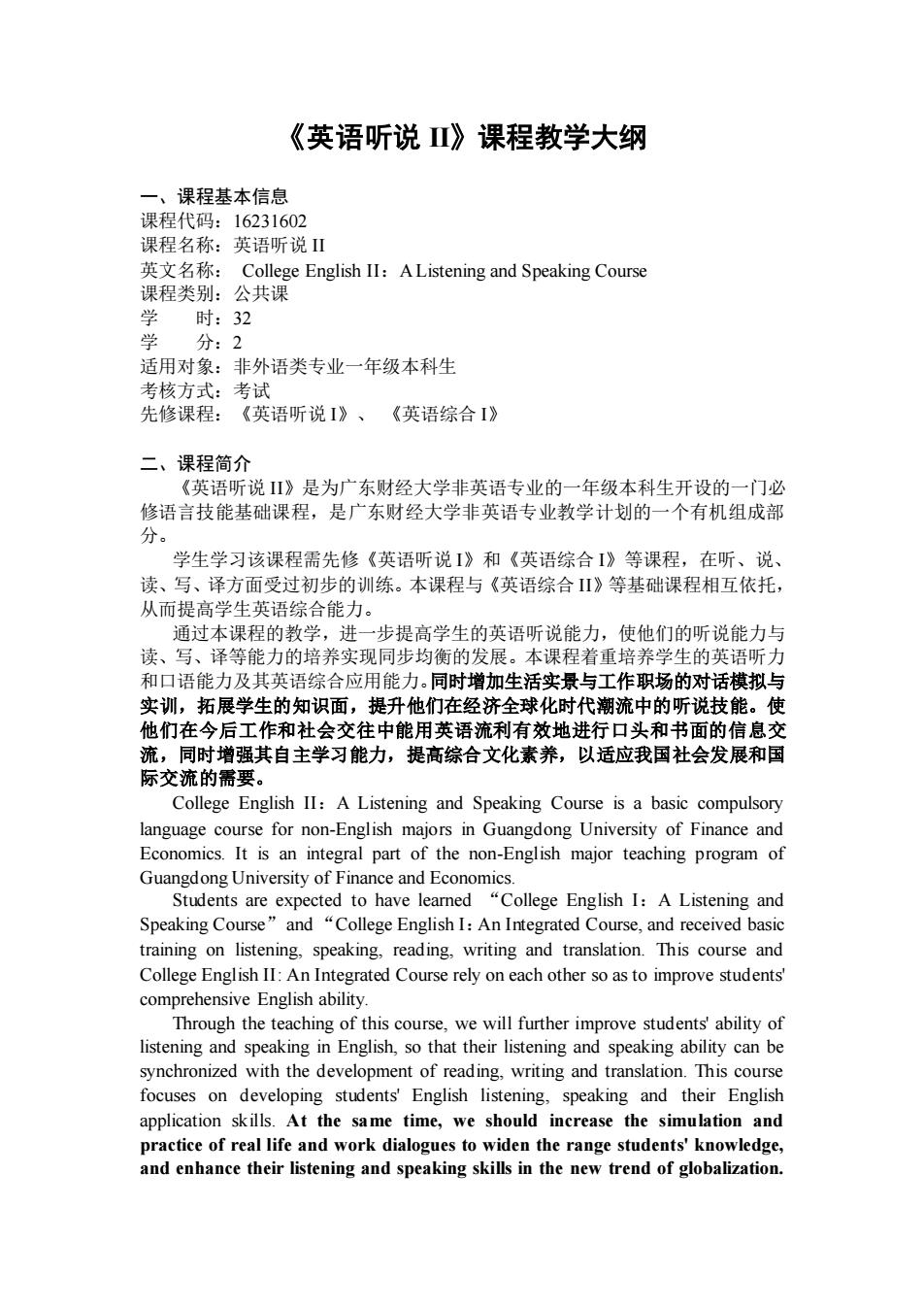
《英语听说Ⅲ》课程教学大纲 、课程基本信息 课程代码:16231602 课程名称:英语听说Ⅱ 英文名称:College English II:AListening and Speaking Course 课程类别 公共课 时:32 学 分:2 适用对象:非外语类专业一年级本科生 考核方式:考式 先修课程:《英语听说》、《英语综合》 二、课程简介 《英语听说Ⅱ》是为广东财经大学非英语专业的一年级本科生开设的一门必 修语言技能基础课程,是广东财经大学非英语专业教学计划的一个有机组成部 分。 学生学习该课程需先修《英语听说I》和《英语综合1》等课程,在听、说 读、写、译方面受过初步的训练。本课程与《英语综合Ⅱ》等基础课程相互依托, 从而提高学生英语综合能力。 通过本课程的教学,进一步提高学生的英语听说能力,使他们的听说能力与 读、写、译等能力的培养实现同步均衡的发展。本课程着重培养学生的英语听力 和口语能力及其英语综合应用能力,同时增加生活实景与工作职场的对话模拟与 实训,拓展学生的知识面,提升他们在经济全球化时代潮流中的听说技能。使 他们在今后工作和社会交往中能用英语流利有效地进行口头和书面的信息交 流,同时增强其自主学习能力,提高综合文化素养,以适应我国社会发展和国 际交流的需要。 College English II:A Listening and Speaking Course is a basic compulsory language course for non-English majors in Guangdong University of Finance and Economics.It is an integral part of the non-English major teaching program of Guangdong University of Finance and Economics. Students are expected to have learned "College English I:A Listening and Speaking Course"and "College English I:An Integ rated Course,and received basic training on listening.speaking.reading.writing and translation.This course and College English II:An Integrated Course rely on each other so as to improve students' comprehensive English ability. Through the teaching of this course,we will further improve students'ability of listening a nd s eaking in Eng their liste nd synchronized with the development of ing,writing and transla on. This cours focuses on developing students'English listening,speaking and their English application skills.At the same time,we should increase the simulation and practice of real life and work dialogues to widen the range students'knowledge. and enhance their listening and speaking skills in the new trend of globalization
《英语听说 II》课程教学大纲 一、课程基本信息 课程代码:16231602 课程名称:英语听说 II 英文名称: College English II:A Listening and Speaking Course 课程类别:公共课 学 时:32 学 分:2 适用对象:非外语类专业一年级本科生 考核方式:考试 先修课程:《英语听说 I》、 《英语综合 I》 二、课程简介 《英语听说 II》是为广东财经大学非英语专业的一年级本科生开设的一门必 修语言技能基础课程,是广东财经大学非英语专业教学计划的一个有机组成部 分。 学生学习该课程需先修《英语听说 I》和《英语综合 I》等课程,在听、说、 读、写、译方面受过初步的训练。本课程与《英语综合 II》等基础课程相互依托, 从而提高学生英语综合能力。 通过本课程的教学,进一步提高学生的英语听说能力,使他们的听说能力与 读、写、译等能力的培养实现同步均衡的发展。本课程着重培养学生的英语听力 和口语能力及其英语综合应用能力。同时增加生活实景与工作职场的对话模拟与 实训,拓展学生的知识面,提升他们在经济全球化时代潮流中的听说技能。使 他们在今后工作和社会交往中能用英语流利有效地进行口头和书面的信息交 流,同时增强其自主学习能力,提高综合文化素养,以适应我国社会发展和国 际交流的需要。 College English II:A Listening and Speaking Course is a basic compulsory language course for non-English majors in Guangdong University of Finance and Economics. It is an integral part of the non-English major teaching program of Guangdong University of Finance and Economics. Students are expected to have learned “College English I:A Listening and Speaking Course”and “College English I:An Integrated Course, and received basic training on listening, speaking, reading, writing and translation. This course and College English II: An Integrated Course rely on each other so as to improve students' comprehensive English ability. Through the teaching of this course, we will further improve students' ability of listening and speaking in English, so that their listening and speaking ability can be synchronized with the development of reading, writing and translation. This course focuses on developing students' English listening, speaking and their English application skills. At the same time, we should increase the simulation and practice of real life and work dialogues to widen the range students' knowledge, and enhance their listening and speaking skills in the new trend of globalization

So that they can use English effectively in their future work and social this course attemp s to enha their inde pendent learning skills improve their comprehensive cultural quality,to meet the needs of China's social development and international exchanges. 三、课程性质与教学目的 《英语听说》课程是广东财经大学本科学生课程设胃的有机组成部分,是 广东财经大学非英语专业本科生一门必修的公共基础课。作为大学英语教学的有 机组成部分 《英语听 说Ⅱ》与《英语综合Ⅱ》形成了 互相补充、 梯度递进的关 系。《英语综合II》帮助学生夯实语言基础(如,语法、词汇等), 培养学 的综合能力,特别是读写能力,《英语听说II》课程以扎实的语言基础为前提, 重点培养学生的听说能力,并使他们在今后工作和社会交往中能用英语有效地进 行口头信息交流。 本课程旨在通过真实的场景、地道的语言和多样的练习提高学生的英语听说 能力,要求教师和学生使用课本、音带、及多媒体光盘与网络教学平台,利用 优势互为补充,将立体化、个性化、自主化的教学带进课堂,充分发挥多媒体声 像技术,通过丰富的教学资源、生动的形式,针对性的训练和有效的管理来提高 学生的实际交流能力。 通过《英语听说Ⅱ》课程的学习,学生应达到下列要求: 听力要求 1.能基本听懂英语国家人士关于日常生活和社会、文化生活的谈话,理解 中心大意,抓住主要论点或情节;能根据所听材料进行推理和分析,领会作者的 态度、感情和真实意图,并用英语作简要笔记。2.能基本听懂慢速英语新闻广 播节目以及有关文化、教育等方面的非专题性讨论录音材料,理解大意,把握作 者的意图 态度和感情。 口语要求: 1.能在一般社交场合与英语国家人士较流利地进行交谈。在交谈时能够恰 当地进行应答和导入话题,能主动展开话题并保持交流顺畅,语音、语调自然, 无重大语法错误,言语基本得体。2.能用英语就所熟悉的话题进行口头交流, 能比较流畅和准确地用英语介绍我国的文化与国情。在交流时能做到条理清晰地 组织和表达思想,语言基本正确,言语基本得体 《英语视听说》课程教学应以主题教学法和任务教学法理论指导教学实践, 以学生为中心,围绕主题设计现实社会中真实的、具有挑战性的相关事情为任务。 以任务为途径,让学生在课堂内外应用语言及交际策略去完成、然后口头汇报和 总结完成任务情况 本课程的教学评估包括形成性评估和终结性评估。 四、教学内容及要求 Unit I Education and Student Life (一)目的与要求 Students are expected to: 1)grasp the main ideas of the video clips and audio passages provided in this unit; 2)understand the topic of Education and Student Life; 3)master the communicative skills of asking for clarification,using expressions of
So that they can use English effectively in their future work and social interactions. In addition, this course attempts to enhance their independent learning skills, improve their comprehensive cultural quality, to meet the needs of China's social development and international exchanges. 三、课程性质与教学目的 《英语听说 II》课程是广东财经大学本科学生课程设置的有机组成部分,是 广东财经大学非英语专业本科生一门必修的公共基础课。作为大学英语教学的有 机组成部分,《英语听说 II》与《英语综合 II》形成了互相补充、梯度递进的关 系。《英语综合II》帮助学生夯实语言基础(如,语法、词汇等),培养学生 的综合能力,特别是读写能力,《英语听说II》课程以扎实的语言基础为前提, 重点培养学生的听说能力,并使他们在今后工作和社会交往中能用英语有效地进 行口头信息交流。 本课程旨在通过真实的场景、地道的语言和多样的练习提高学生的英语听说 能力,要求教师和学生使用课本、音带、及多媒体光盘与网络教学平台,利用其 优势互为补充,将立体化、个性化、自主化的教学带进课堂,充分发挥多媒体声 像技术,通过丰富的教学资源、生动的形式,针对性的训练和有效的管理来提高 学生的实际交流能力。 通过《英语听说 II》课程的学习,学生应达到下列要求: 听力要求: 1.能基本听懂英语国家人士关于日常生活和社会、文化生活的谈话,理解 中心大意,抓住主要论点或情节;能根据所听材料进行推理和分析,领会作者的 态度、感情和真实意图,并用英语作简要笔记。2.能基本听懂慢速英语新闻广 播节目以及有关文化、教育等方面的非专题性讨论录音材料,理解大意,把握作 者的意图、态度和感情。 口语要求: 1.能在一般社交场合与英语国家人士较流利地进行交谈。在交谈时能够恰 当地进行应答和导入话题,能主动展开话题并保持交流顺畅,语音、语调自然, 无重大语法错误,言语基本得体。2.能用英语就所熟悉的话题进行口头交流, 能比较流畅和准确地用英语介绍我国的文化与国情。在交流时能做到条理清晰地 组织和表达思想,语言基本正确,言语基本得体。 《英语视听说》课程教学应以主题教学法和任务教学法理论指导教学实践, 以学生为中心,围绕主题设计现实社会中真实的、具有挑战性的相关事情为任务。 以任务为途径,让学生在课堂内外应用语言及交际策略去完成、然后口头汇报和 总结完成任务情况。 本课程的教学评估包括形成性评估和终结性评估。 四、教学内容及要求 Unit 1 Education and Student Life (一)目的与要求 Students are expected to: 1) grasp the main ideas of the video clips and audio passages provided in this unit; 2) understand the topic of Education and Student Life; 3) master the communicative skills of asking for clarification, using expressions of

location,and describing map locations 4 developcritical thinking skills 5)build vocabulary and improve pronunciation. (二)教学内容 1.主要内容 1)Vocabulary building 2)Cultural notes a)College and university b)Honor code 3)Listening skills and strategies a)Using the Introduction to Predict Lecture Content b)Getting Meaning from Context c)Getting Meaning from Intonation d)Three Kevs to Writing Effective Lecture Notes 4)Speaking skills and strategies a)Asking for clarification b)Using expressions of location c)Describing map locations 2.基本概念与知识点 1)Vocabulary building Words and expressions:identification,for short,major. work out,dormitory fill out,rush,pretty goo penalty,plagiarism,quotation marks,source syllabus.term paper.avoid.cite.cut and paste.expect.get caught.give credit. paraphrase.quote,summarize,unique 2)Cultural notes a)In conversational American English,the words college and university mean the samething. A college or a universitv is a place where students go after high school to continuetheir education.In the U.S.,it normally takes four years to finish college and reeivea bachelor'sdegree Some collees called" scho ols whe stude ud Man students transfer from there to afour-year college/university to complete the degrees b)Honor Code University students in the u s and Canada must r romise to follow a set of les about honest behavior thes rules e called the“Acader mic Hon CodeSome universities ask students to read the honor code.Others requir students to sign it.Here are some examples of honor codes from well-known universities "I pledge my honor that I have not violated the honor code during this xamination” -Princeton University
location, and describing map locations; 4) develop critical thinking skills; 5) build vocabulary and improve pronunciation. (二)教学内容 1. 主要内容 1) Vocabulary building 2) Cultural notes a) College and university b) Honor code 3) Listening skills and strategies a) Using the Introduction to Predict Lecture Content b) Getting Meaning from Context c) Getting Meaning from Intonation d) Three Keys to Writing Effective Lecture Notes 4) Speaking skills and strategies a) Asking for clarification b) Using expressions of location c) Describing map locations 2. 基本概念与知识点 1) Vocabulary building Words and expressions: identification, for short, major, work out, dormitory, fill out, rush, pretty good, penalty, plagiarism, quotation marks, source, syllabus, term paper, avoid, cite, cut and paste, expect, get caught, give credit, paraphrase, quote, summarize, unique 2) Cultural notes a) In conversational American English, the words college and university mean the samething. A college or a university is a place where students go after high school to continuetheir education. In the U.S., it normally takes four years to finish college and receivea bachelor’s degree. Some colleges, called “community colleges,” are two-yearschools where students study basic courses. Many students transfer from there to afour-year college/university to complete their degrees. b) Honor Code University students in the U.S. and Canada must promise to follow a set of rules about honest behavior. These rules are called the “Academic Honor Code.” Some universities ask students to read the honor code. Others require students to sign it. Here are some examples of honor codes from well-known universities: “I pledge my honor that I have not violated the honor code during this examination.” — Princeton University
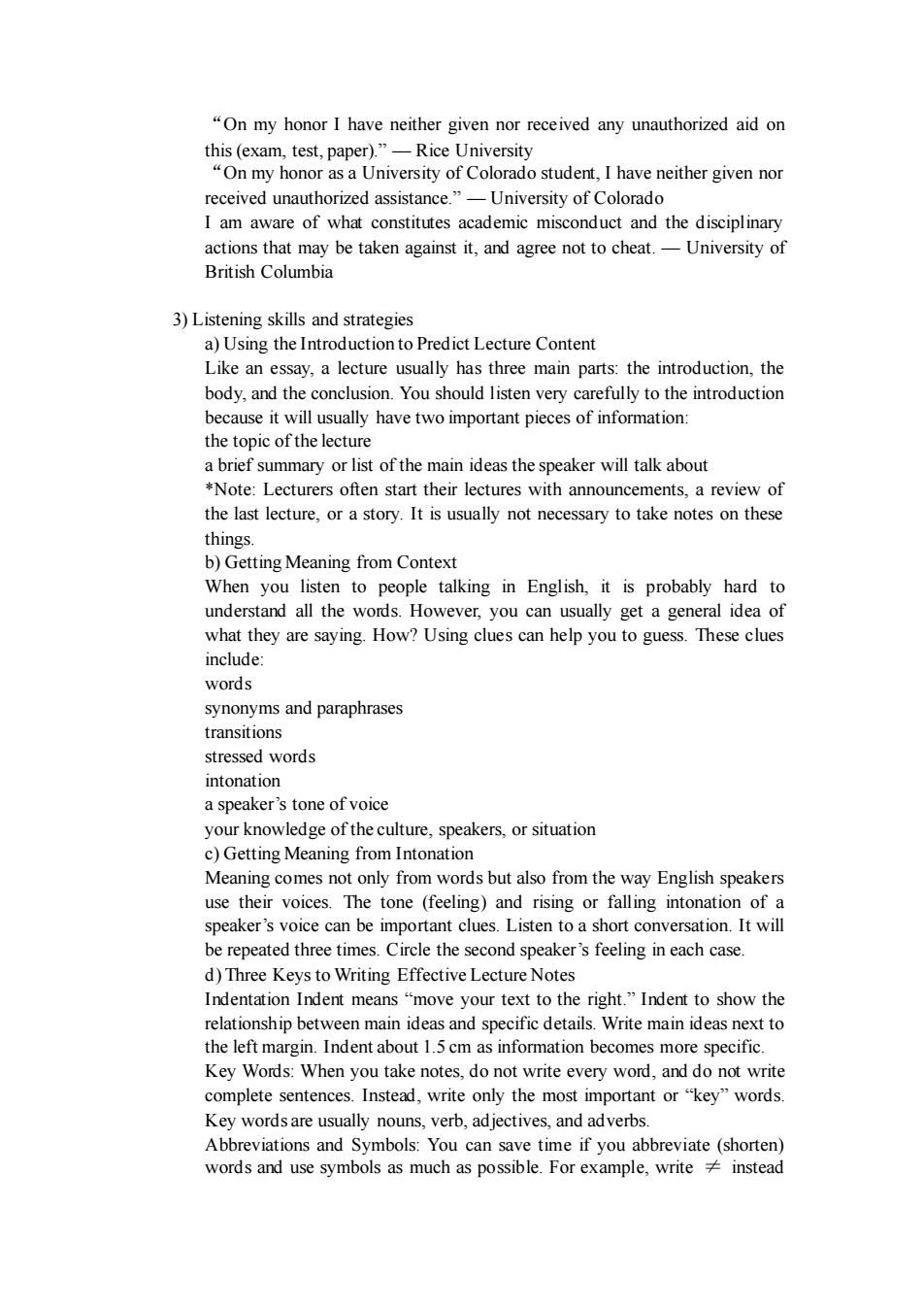
"On my honor I have neither given nor received any unauthorized aid on nor as a received unauthorized assistance."-University of Colorado I am aware of what constitutes academic misconduct and the disciplinary actions that may be taken against it.and agree not to cheat-University of British columbia 3)Listening skills and strategies a)Using the Introduction to Predict Lecture Content Like an essay,a lecture usually has three main parts:the introduction,the body,and the conclusion.You should listen very carefully to the introduction information: the topic of the lecture a brief summary or list of the main ideas the speaker will talk about *Note:Lecturers often start their lectures with announcements,a review of the last lecture or a story it is usually not necessary to take notes on these When you listen to people talking in English,it is probably hard to understand all the words.However,you can usually get a general idea of what they are saying.How?Using clues can help you to guess.These clues include words synonyms and paraphrases transitions stressed words intonation a speaker's tone of voice your knowledge of the culture,speakers,or situation c)Getting Meaning from Intonation Meaning comes not only from words but also from the way English speakers use their voices The tone (feeling)and rising or falling intonation of a speaker'voe be be repeated three times.Circle the second speaker's feeling in each case d)Three Keys to Writing Effective Lecture Notes Indentation Indent means "move your text to the right."Indent to show the relationship between main ideas and specific details.Write main ideas next to the left margin.Indent about 1.5cm as information becomes more specific. Key Words:Whe ou take notes,do not write very word,and d not w complete sentences.Instead,write only the most important or"key"words Key words are usually nouns,verb,adjectives,and adverbs. Abbreviations and Symbols:You can save time if you abbreviate(shorten) words and use symbols as much as possible.For example,write instead
“On my honor I have neither given nor received any unauthorized aid on this (exam, test, paper).” — Rice University “On my honor as a University of Colorado student, I have neither given nor received unauthorized assistance.” — University of Colorado I am aware of what constitutes academic misconduct and the disciplinary actions that may be taken against it, and agree not to cheat. — University of British Columbia 3) Listening skills and strategies a) Using the Introduction to Predict Lecture Content Like an essay, a lecture usually has three main parts: the introduction, the body, and the conclusion. You should listen very carefully to the introduction because it will usually have two important pieces of information: the topic of the lecture a brief summary or list of the main ideas the speaker will talk about *Note: Lecturers often start their lectures with announcements, a review of the last lecture, or a story. It is usually not necessary to take notes on these things. b) Getting Meaning from Context When you listen to people talking in English, it is probably hard to understand all the words. However, you can usually get a general idea of what they are saying. How? Using clues can help you to guess. These clues include: words synonyms and paraphrases transitions stressed words intonation a speaker’s tone of voice your knowledge of the culture, speakers, or situation c) Getting Meaning from Intonation Meaning comes not only from words but also from the way English speakers use their voices. The tone (feeling) and rising or falling intonation of a speaker’s voice can be important clues. Listen to a short conversation. It will be repeated three times. Circle the second speaker’s feeling in each case. d) Three Keys to Writing Effective Lecture Notes Indentation Indent means “move your text to the right.” Indent to show the relationship between main ideas and specific details. Write main ideas next to the left margin. Indent about 1.5 cm as information becomes more specific. Key Words: When you take notes, do not write every word, and do not write complete sentences. Instead, write only the most important or “key” words. Key words are usually nouns, verb, adjectives, and adverbs. Abbreviations and Symbols: You can save time if you abbreviate (shorten) words and use symbols as much as possible. For example, write ≠ instead
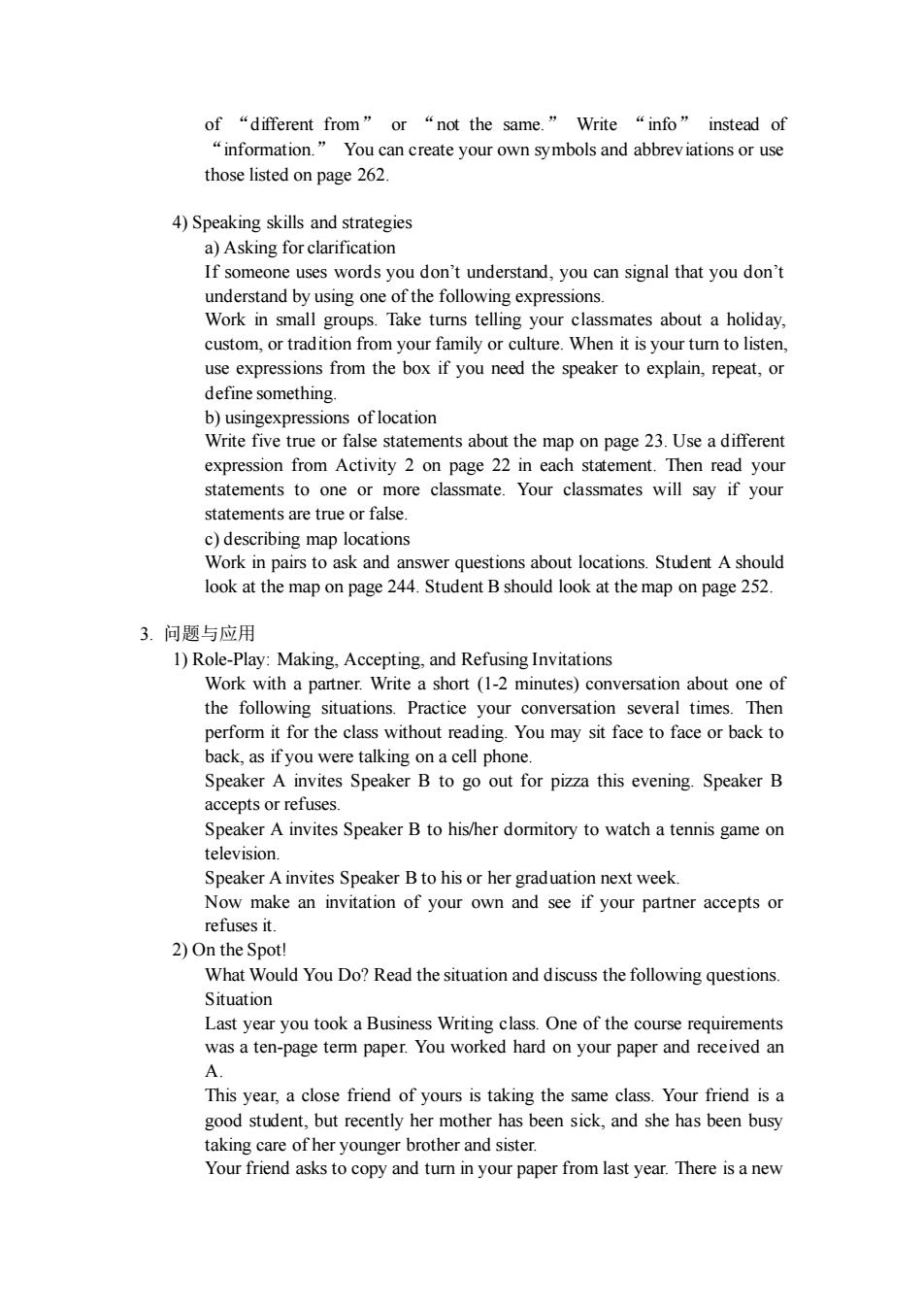
of“different from”or“not the same.”Write“info”instead of "information."You can create your own symbols and abbreviationsor use those listed on page 262. 4)Speaking skills and strategies a)Asking for clarification If someone uses words you don't understard,you can signal that you don' under stand by using one of the following expressions. Work in small groups.Take turns telling your classmates about a holiday custom,or tradition from your family or culture.When it is your turn to listen, use expressions from the box if you need the speaker to explain.repeat.or define something b)usingexpressions of location Write five true or false statements about the map on page 23.Use a different expression from Activity 2 on page 22 in each statement.Then read your statements to one or more classmate.Your classmates will say if vour statements are true or false. look at the map on page 244.Student B should look at the map on page 252. 3.问题与应用 1)Role-Play:Making.Accepting.and Refusing Invitation with a partner.Write a short (1-2 minutes)conversation about one of the following situations.Practice your conversation several times.Then perform it for the class without reading.You may sit face to face or back to back.as if you were talking on a cell phone Speaker A invites Speaker B to go out for pizza this evening.Speaker B accept refuses Speaker A invites Speaker B to his/her dormitory to watch a tennis game on television. Speaker a invites sneaker r to his or her graduation next week Now make an invitation of your own and see if your partner accepts or refuse 2)On the Sp What Would You Do?Read the situation and discuss the following questions. Situation Last year you took a Business Writing class.One of the course requirements was a ten-page term paper.You vorked hard on your paper a nd A This year,a close friend of yours is taking the same class.Your friend is a good student,but recently her mother has been sick,and she has been busy taking care of her vounger brother and sister. Your friend asks to c copy and tum in your paper from last year.There is a new
of “different from” or “not the same.” Write “info” instead of “information.” You can create your own symbols and abbreviations or use those listed on page 262. 4) Speaking skills and strategies a) Asking for clarification If someone uses words you don’t understand, you can signal that you don’t understand by using one of the following expressions. Work in small groups. Take turns telling your classmates about a holiday, custom, or tradition from your family or culture. When it is your turn to listen, use expressions from the box if you need the speaker to explain, repeat, or define something. b) usingexpressions of location Write five true or false statements about the map on page 23. Use a different expression from Activity 2 on page 22 in each statement. Then read your statements to one or more classmate. Your classmates will say if your statements are true or false. c) describing map locations Work in pairs to ask and answer questions about locations. Student A should look at the map on page 244. Student B should look at the map on page 252. 3. 问题与应用 1) Role-Play: Making, Accepting, and Refusing Invitations Work with a partner. Write a short (1-2 minutes) conversation about one of the following situations. Practice your conversation several times. Then perform it for the class without reading. You may sit face to face or back to back, as if you were talking on a cell phone. Speaker A invites Speaker B to go out for pizza this evening. Speaker B accepts or refuses. Speaker A invites Speaker B to his/her dormitory to watch a tennis game on television. Speaker A invites Speaker B to his or her graduation next week. Now make an invitation of your own and see if your partner accepts or refuses it. 2) On the Spot! What Would You Do? Read the situation and discuss the following questions. Situation Last year you took a Business Writing class. One of the course requirements was a ten-page term paper. You worked hard on your paper and received an A. This year, a close friend of yours is taking the same class. Your friend is a good student, but recently her mother has been sick, and she has been busy taking care of her younger brother and sister. Your friend asks to copy and turn in your paper from last year. There is a new
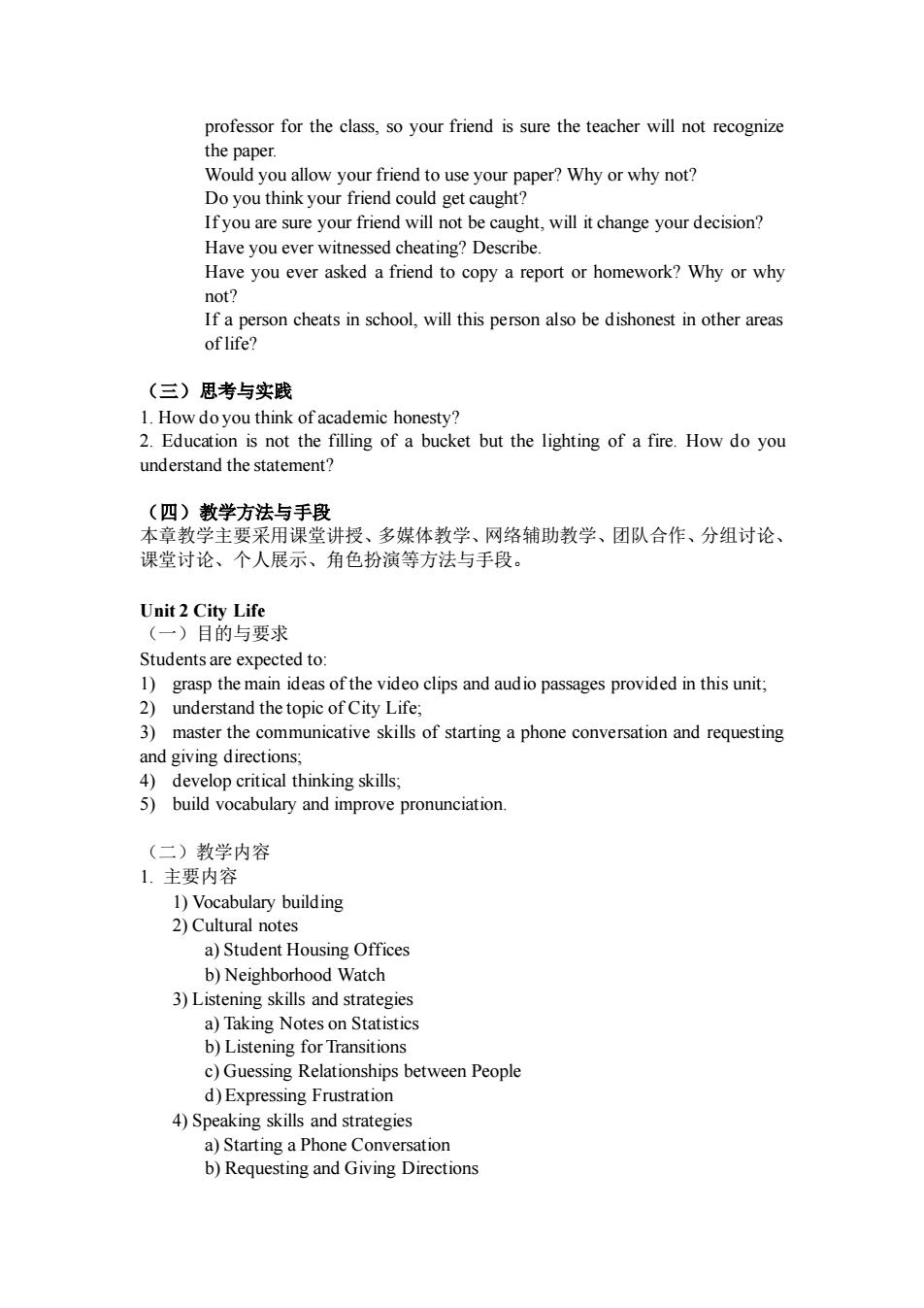
eo for the s,your issure the teacher will not epape Would you allow your friend to use your paper?Why or why not Do you think your friend could get caught? Ifyou are sure your friend will not be caught.will it change your decision? Have you ever witnessed cheating?Describe. Have you ever asked a friend to copy a report or homework?Why or why If a person cheats in school,will this person also be dishonest in other areas of life? (三)思考与实践 1.How doyou think honesty? 2 Education is o of a bucket but the lighting of a fire.How do you understand the statement? (四)教学方法与手段 本章教学主要采用课堂讲授、多媒体教学、网络辅助教学、团队合作、分组讨论、 课堂讨论、个人展示、角色扮演等方法与手段。 Unit 2 City Life (一)目的与要求 Studentsare expected to grasp the e m ain ideas of the video clips and audio passages provided in this unit 2)understand the topic of City Life; 3)master the communicative skills of starting a phone conversation and requesting and giving directions. 4)develop critical thinking skills 5)build cabulary and i improve pronunciation (二)教学内容 1.主要内容 1)Vocabulary building 2)Cultural notes a)Studen Housing Offices b)Neighborhood Watch 3)Listening skills and strategies a)Taking Notes on Statistics b)Listening for Transitions c)Guessing Relation hips be ween People d)Expressing Frustration 4)Speaking skills and strategies a)Starting a Phone Conversation b)Requesting and Giving Directions
professor for the class, so your friend is sure the teacher will not recognize the paper. Would you allow your friend to use your paper? Why or why not? Do you think your friend could get caught? If you are sure your friend will not be caught, will it change your decision? Have you ever witnessed cheating? Describe. Have you ever asked a friend to copy a report or homework? Why or why not? If a person cheats in school, will this person also be dishonest in other areas of life? (三)思考与实践 1. How do you think of academic honesty? 2. Education is not the filling of a bucket but the lighting of a fire. How do you understand the statement? (四)教学方法与手段 本章教学主要采用课堂讲授、多媒体教学、网络辅助教学、团队合作、分组讨论、 课堂讨论、个人展示、角色扮演等方法与手段。 Unit 2 City Life (一)目的与要求 Students are expected to: 1) grasp the main ideas of the video clips and audio passages provided in this unit; 2) understand the topic of City Life; 3) master the communicative skills of starting a phone conversation and requesting and giving directions; 4) develop critical thinking skills; 5) build vocabulary and improve pronunciation. (二)教学内容 1. 主要内容 1) Vocabulary building 2) Cultural notes a) Student Housing Offices b) Neighborhood Watch 3) Listening skills and strategies a) Taking Notes on Statistics b) Listening for Transitions c) Guessing Relationships between People d) Expressing Frustration 4) Speaking skills and strategies a) Starting a Phone Conversation b) Requesting and Giving Directions
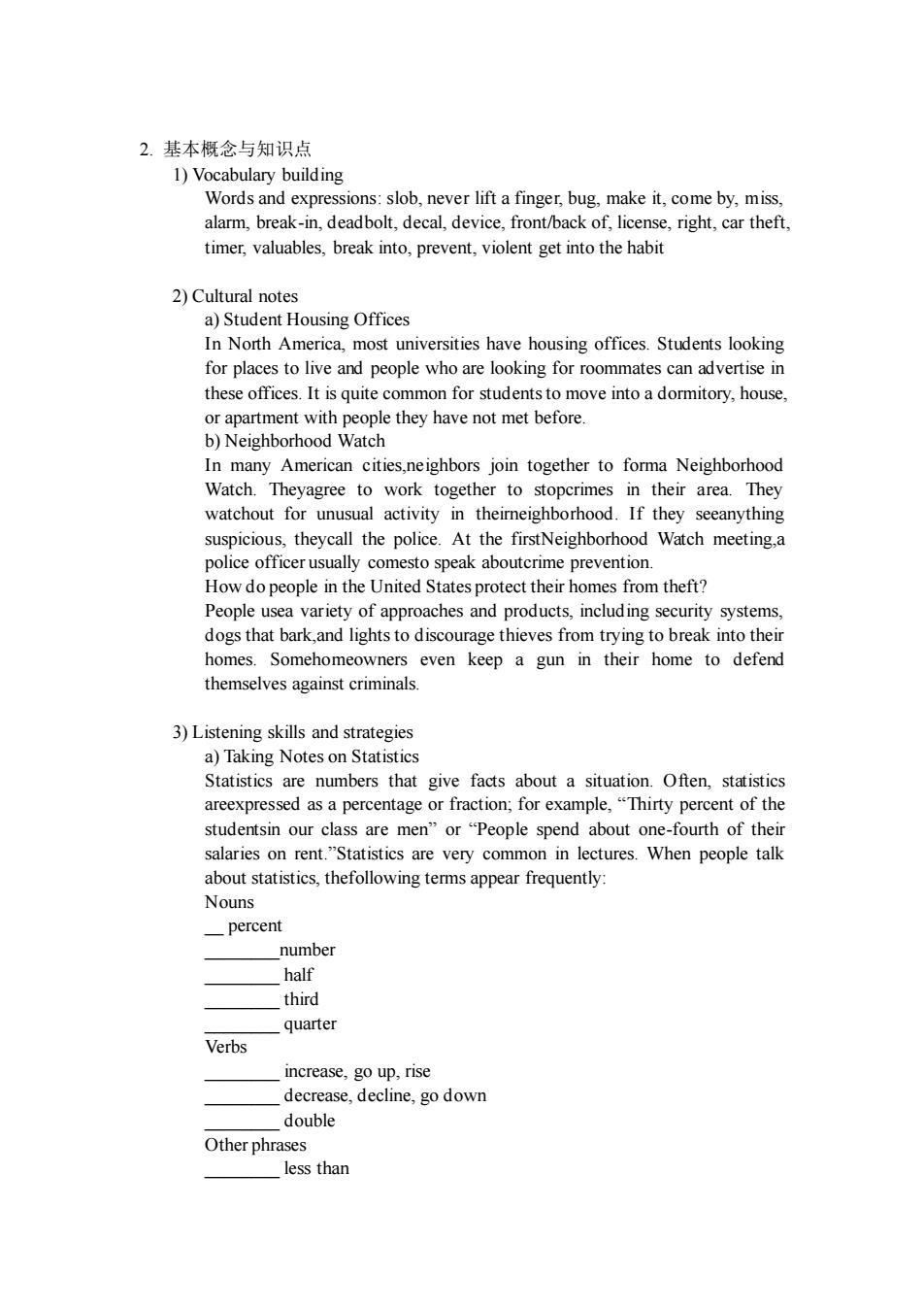
2.基本概念与知识点 1)Vocabulary building Words and expressions:slob,never lift a finger,bug.make it,come by,miss. alarm,break-in,deadbolt,decal,device,front/back of,license,right,car theft. timer,valuables,break into,prevent,violent get into the habit 2)Cultural notes a)Student Housing Offices In North America,most universities have housing offices.Students looking for places to live and people who are looking for roommates can advertise in these offices.It is quite on for studen nove into a dormitory,house or apartment wit b)Neighborhood Watch In many American cities neighbors ioin together to forma neighborhood Watch.Theyagree to work together to stopcrimes in their area.They watchout for unusual activity in theimeighborhood.If they seeanything suspicious theyc all the police.At the firstNeighborhood Watch meeting.a police officer usually comesto speak aboutcrime prevention How do people in the United States protect their homes from theft? People usea variety of approaches and products,including security systems Somehor even keep a gun in the: to 3)Listening skills and strategies a)Taking Notes on Statistics Statistics are numbers that give facts about a situation.Often,statistics aree Thirty percent of the studentsin our class are men or "People spend about one-fourth of ther salaries on rent."Statistics are very common in lectures.When people talk about statistics,thefollowing terms appear frequently: Nouns -percent _number half third _quarter Verhs increase,go up,rise decrease.decline,go down double Other phrases less than
2. 基本概念与知识点 1) Vocabulary building Words and expressions: slob, never lift a finger, bug, make it, come by, miss, alarm, break-in, deadbolt, decal, device, front/back of, license, right, car theft, timer, valuables, break into, prevent, violent get into the habit 2) Cultural notes a) Student Housing Offices In North America, most universities have housing offices. Students looking for places to live and people who are looking for roommates can advertise in these offices. It is quite common for students to move into a dormitory, house, or apartment with people they have not met before. b) Neighborhood Watch In many American cities,neighbors join together to forma Neighborhood Watch. Theyagree to work together to stopcrimes in their area. They watchout for unusual activity in theirneighborhood. If they seeanything suspicious, theycall the police. At the firstNeighborhood Watch meeting,a police officer usually comesto speak aboutcrime prevention. How do people in the United States protect their homes from theft? People usea variety of approaches and products, including security systems, dogs that bark,and lights to discourage thieves from trying to break into their homes. Somehomeowners even keep a gun in their home to defend themselves against criminals. 3) Listening skills and strategies a) Taking Notes on Statistics Statistics are numbers that give facts about a situation. Often, statistics areexpressed as a percentage or fraction; for example, “Thirty percent of the studentsin our class are men” or “People spend about one-fourth of their salaries on rent.”Statistics are very common in lectures. When people talk about statistics, thefollowing terms appear frequently: Nouns __ percent ________number ________ half ________ third ________ quarter Verbs ________ increase, go up, rise ________ decrease, decline, go down ________ double Other phrases ________ less than
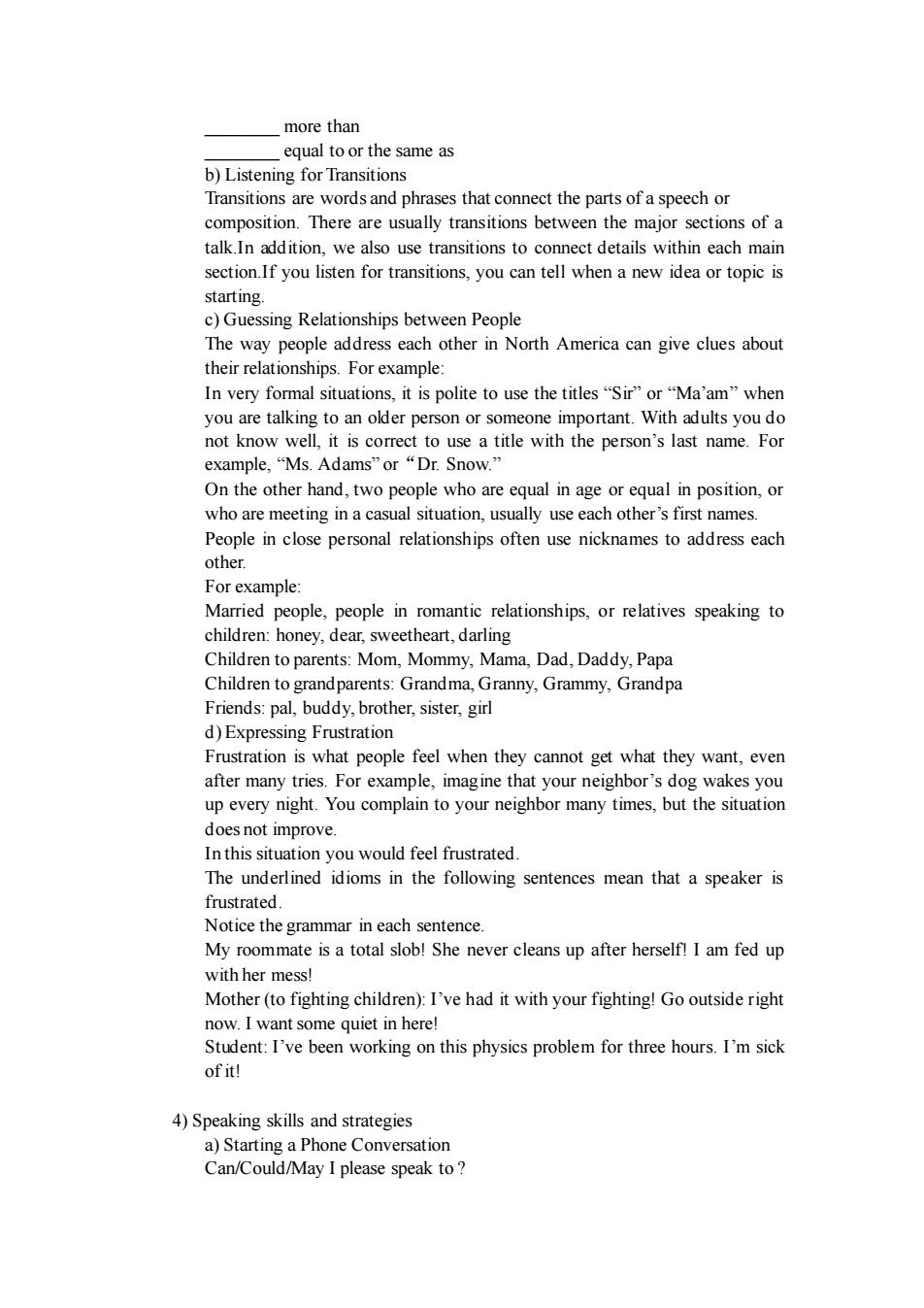
more than ual toor the same as b)Listening for Transitions Transitions are words and phrases that connect the parts of a speech or composition.There are usually transitions between the maior sections of a talk in addition.we also use transitions to connect details within each main section.If you listen for transitions,you can tell wher new idea or topic starting c)Guessing Relationships between People The way people address each other in North America can give clues about their relationships.For example: In very formal situations,it is polite to use the titles"Sir"or"Ma'am"when you are talkin an oer person or so not kr example."Ms.Adams"or "Dr.Snow. On the other hand,two people who are equal in age or equal in position.or who are meeting in a casual situation,usually use each other's first names. People in persoa relationships ofte n use nicknames to address each other For example. Married people,people in romantic relationships,or relatives speaking to children:honey,dear,sweetheart,darling Children to parents:Mom,Mommy,Mama,Dad,Daddy,Papa Childre en to grand s:Gra dma,Granny,Grammy,Grandpa Friends:pal,buddy,brother,sister,gir d)Expressing frustration Frustration is what people feel when they cannot get what they want,even after many tries.For example,imagine that your neighbor's dog wakes you up every night.You nlai to you neighb many tim es,bu the sit does not improve In this situation you would feel frustrated. The underlined idioms in the following sentences mean that a speaker is frustrated. Notice the grammar in each sentence My roommate is a total slob! She never cleans up after herself!I am fed up with her mess Mother(to fighting children):I've had it with your fighting!Go outside right now.I want some quiet in herel Student:I've been working on this physics problem for three hours.I'm sick of it! 4)Speaking skills and strategies a)Starting a Phone Conversation Can/Could/May I please speak to?
________ more than ________ equal to or the same as b) Listening for Transitions Transitions are words and phrases that connect the parts of a speech or composition. There are usually transitions between the major sections of a talk.In addition, we also use transitions to connect details within each main section.If you listen for transitions, you can tell when a new idea or topic is starting. c) Guessing Relationships between People The way people address each other in North America can give clues about their relationships. For example: In very formal situations, it is polite to use the titles “Sir” or “Ma’am” when you are talking to an older person or someone important. With adults you do not know well, it is correct to use a title with the person’s last name. For example, “Ms. Adams” or“Dr. Snow.” On the other hand, two people who are equal in age or equal in position, or who are meeting in a casual situation, usually use each other’s first names. People in close personal relationships often use nicknames to address each other. For example: Married people, people in romantic relationships, or relatives speaking to children: honey, dear, sweetheart, darling Children to parents: Mom, Mommy, Mama, Dad, Daddy, Papa Children to grandparents: Grandma, Granny, Grammy, Grandpa Friends: pal, buddy, brother, sister, girl d) Expressing Frustration Frustration is what people feel when they cannot get what they want, even after many tries. For example, imagine that your neighbor’s dog wakes you up every night. You complain to your neighbor many times, but the situation does not improve. In this situation you would feel frustrated. The underlined idioms in the following sentences mean that a speaker is frustrated. Notice the grammar in each sentence. My roommate is a total slob! She never cleans up after herself! I am fed up with her mess! Mother (to fighting children): I’ve had it with your fighting! Go outside right now. I want some quiet in here! Student: I’ve been working on this physics problem for three hours. I’m sick of it! 4) Speaking skills and strategies a) Starting a Phone Conversation Can/Could/May I please speak to ?

Is there? I'd like to speak to Speaking. This is he/she. This is My name is.[used bystrangers talking for the first time] This is.[used when peopleknow each other I'm calling about. I'm calling because. Let me tell you why I called. WelL thanks for the information It was nice talking to you anks for calling I'll be in touch(with you) b)Requesting and Giving Directions Excuse me where is Can/could you tell me where How doI get to Do you know where ?is? Verbs:go.walk.drive.turn Directions:up/down the street; north.south,east,west: Distance:half a block one mile. ,two kilometers Prepositions:on the left/right:on ?Street: 3.问题与应用 1)Role-Pla Work with a partner.Role-play phone conversations.Be sure to use the expressions for opening and closing a phone conversation. 2)Requesting and giving directions Work in pairs to request and give directions using maps 3)On the Spot! What Would You Do?Read the situation and discuss the following questions Situation You have come to the United States to study at a university.You have rented a roomin the home of a very nice American family.The neighborhood is quiet and pretty,andthe house is near your school.You are comfortable and appy in yo newhome.Oe day.while preparing food in thekitchen you discover a gu inside a cabine Discuss the following questions in small groups. 1.Imagine that you have just discovered the gun.How do you feel? 2.What will you do next?Will you speak to the homeowners about the gun?What will you say?
Is there? I’d like to speak to. Speaking. This is he/she. This is. My name is . [used bystrangers talking for the first time] This is . [used when peopleknow each other] I’m calling about… I’m calling because… Let me tell you why I called. Well, thanks for the information. It was nice talking to you. Thanks for calling. I’ll be in touch (with you). b) Requesting and Giving Directions Excuse me, where is ____? Can/could you tell me where ____? is? How do I get to ____?? Do you know where ____? is? Verbs: go, walk, drive, turn Directions: up/down the street; north, south, east, west; right, left; straight Distance: half a block, one mile, two kilometers Prepositions: on the left/right; on ____? Street; 3. 问题与应用 1) Role-Play Work with a partner. Role-play phone conversations. Be sure to use the expressions for opening and closing a phone conversation. 2) Requesting and Giving Directions Work in pairs to request and give directions using maps. 3) On the Spot! What Would You Do? Read the situation and discuss the following questions. Situation You have come to the United States to study at a university. You have rented a roomin the home of a very nice American family. The neighborhood is quiet and pretty, andthe house is near your school. You are comfortable and happy in your new home.One day, while preparing food in the kitchen, you discover a gun inside a cabinet Discuss the following questions in small groups. 1. Imagine that you have just discovered the gun. How do you feel? 2. What will you do next? Will you speak to the homeowners about the gun?What will you say?
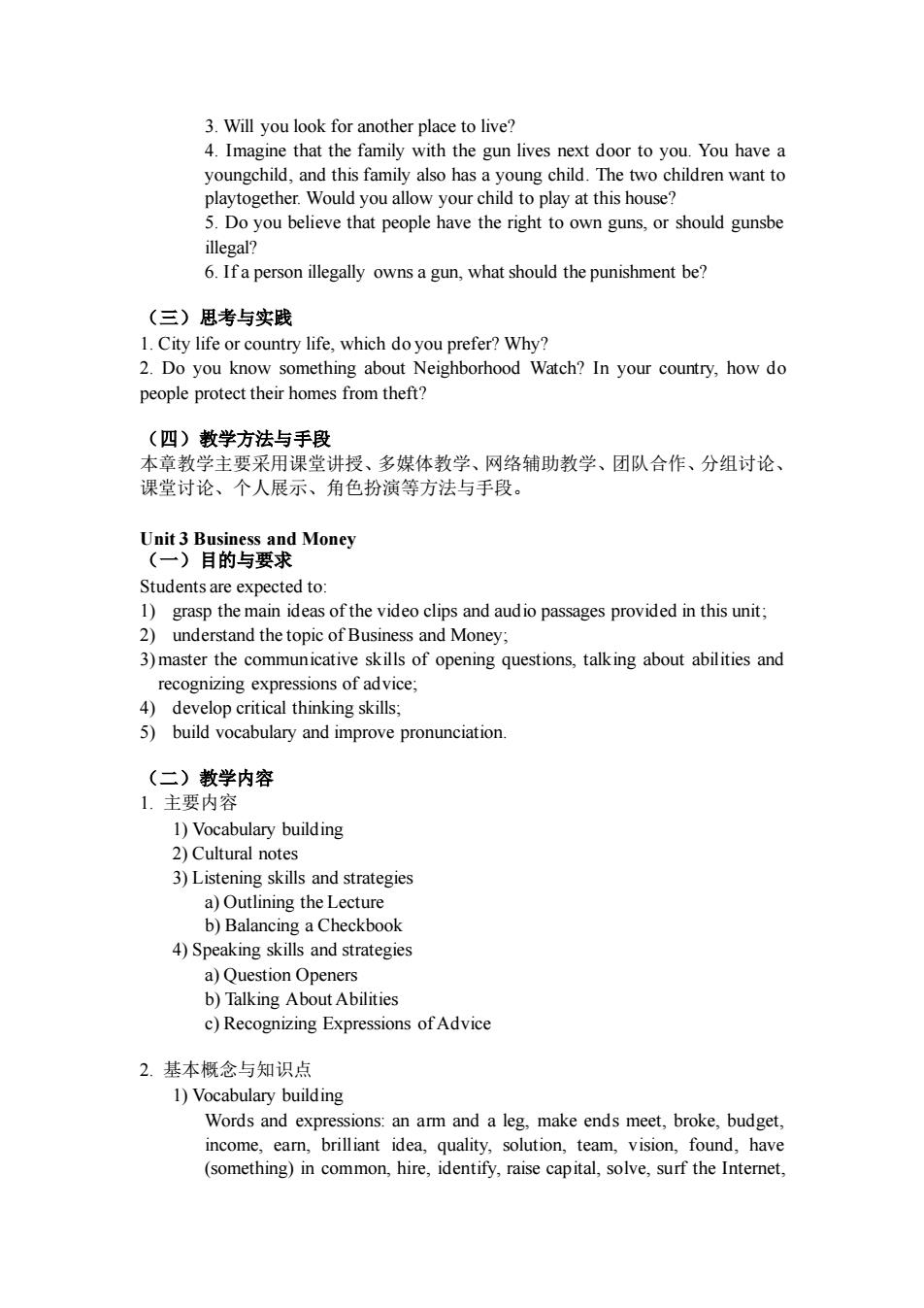
3 Will you look for another place to live? 4.Imag that the fa ily with the gun lives next door to you.You have a youngchild .and this family also has a young child.The two children want to playtogether.Would you allow your child to play at this house? 5.Do you believe that people have the right to own guns,or should gunsbe illegal? 6.Ifa person illegally owns a gun,what should the punishment be? (三)思考与实践 1.City life or country life.which do you prefer?Why? 2.Do you know something about Neighborhood Watch?In your country,how do people protect their homes from theft? )教学方法与手段 本 章教学主要采用课堂讲授、多媒体教学、网络辅助教学、团队合作、分组讨论、 课堂讨论、个人展示、角色扮演等方法与手段。 nd Money Students are expected to: 1)grasp the main ideas of the video clips and audio passages provided in this unit; 2)understand the topic of Business and Money; 3)master the commu icative skills of opening questions,talking about abilities and develop critical thinking skills; 5)build vocabulary and improve pronunciation (二)教学内容 1.主要内容 1)Vocabulary building 2)Cultural notes 3)Listening skills and strategies a)Outlining the Lecture b)Balancing a Checkbook 4)Speaking skills a)Question Openers b)Talking About Abilities c)Recognizing expressions of advice 2基本概念与知识占 1)Vocabulary building Words and expressions:an arm and a leg,make ends meet,broke,budget, income,earn,brilliant idea,quality,solution,team,vision,found,have (something)in common,hire,identify,raise capital,solve,surf the Internet
3. Will you look for another place to live? 4. Imagine that the family with the gun lives next door to you. You have a youngchild, and this family also has a young child. The two children want to playtogether. Would you allow your child to play at this house? 5. Do you believe that people have the right to own guns, or should gunsbe illegal? 6. If a person illegally owns a gun, what should the punishment be? (三)思考与实践 1. City life or country life, which do you prefer? Why? 2. Do you know something about Neighborhood Watch? In your country, how do people protect their homes from theft? (四)教学方法与手段 本章教学主要采用课堂讲授、多媒体教学、网络辅助教学、团队合作、分组讨论、 课堂讨论、个人展示、角色扮演等方法与手段。 Unit 3 Business and Money (一)目的与要求 Students are expected to: 1) grasp the main ideas of the video clips and audio passages provided in this unit; 2) understand the topic of Business and Money; 3) master the communicative skills of opening questions, talking about abilities and recognizing expressions of advice; 4) develop critical thinking skills; 5) build vocabulary and improve pronunciation. (二)教学内容 1. 主要内容 1) Vocabulary building 2) Cultural notes 3) Listening skills and strategies a) Outlining the Lecture b) Balancing a Checkbook 4) Speaking skills and strategies a) Question Openers b) Talking About Abilities c) Recognizing Expressions of Advice 2. 基本概念与知识点 1) Vocabulary building Words and expressions: an arm and a leg, make ends meet, broke, budget, income, earn, brilliant idea, quality, solution, team, vision, found, have (something) in common, hire, identify, raise capital, solve, surf the Internet